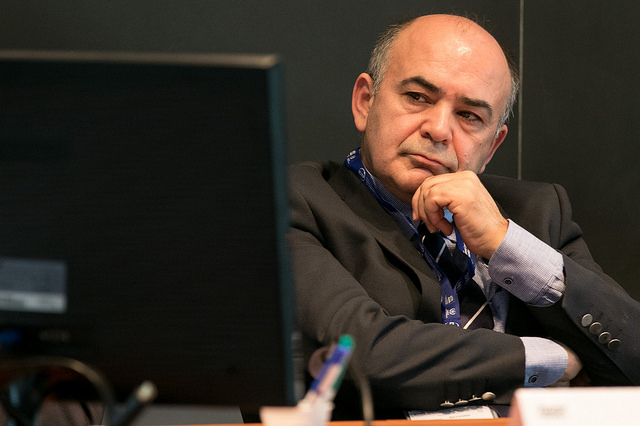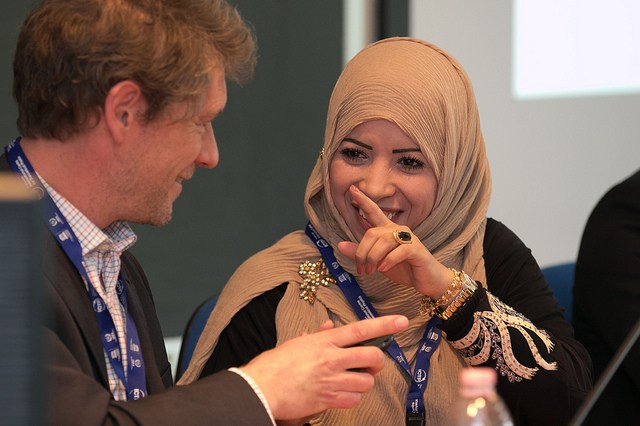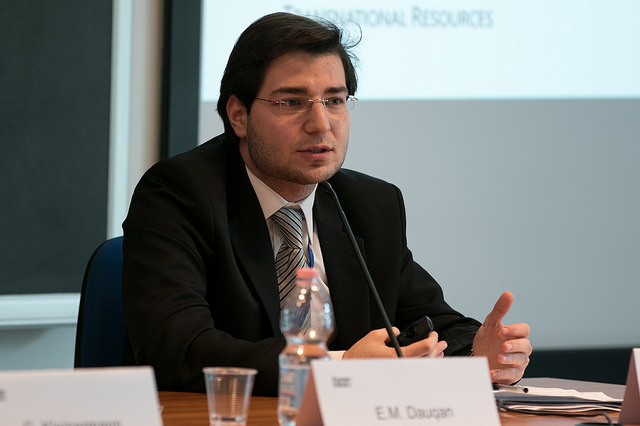Refugees who flee violence in their home countries present a massive number of dilemmas for the countries where they arrive seeking asylum. How to help these people and meet their needs? How to integrate them into society? How to keep them professionally active so that they can someday return home to continue their work?
Recent history offers some answers, or at least some clues. At a workshop co-sponsored by TWAS, several examples were presented of how countries helped refugee scientists, and how indiviudal scientists have helped refugees. The ultimate goal was to present a starting point for conversation, though it also provided a glimmer of hope for participants attempting to address a complex issue.
 One major example is Turkey. It’s typically the countries adjacent to the crises that absorb the bulk of the refugees. And Turkey has some unique challenges when it comes to managing refugees fleeing the Syrian Civil War, said M. Murat Erdoğan of Hacettepe University’s Migration and Politics Research Center-HUGO in Ankara, Turkey.
One major example is Turkey. It’s typically the countries adjacent to the crises that absorb the bulk of the refugees. And Turkey has some unique challenges when it comes to managing refugees fleeing the Syrian Civil War, said M. Murat Erdoğan of Hacettepe University’s Migration and Politics Research Center-HUGO in Ankara, Turkey.
The nation hosts 3.6 million refugees total, 3.27 million of them Syrian. That’s 4% of Turkey’s entire population. About 8% live in refugee camps, but the rest live among Turkish people in urban areas; Istanbul alone has 570,000. He said Turkish society, NGO’s and bureaucrats are doing its best to integrate them.
“I have no doubt they will stay in Turkey forever,” said Erdoğan. “And because of that we have to make integration policy.”
Turkey’s challenges are particularly huge. Most of their refugees come from Syria’s northern rural areas, and about 33% are illiterate. This is far and away the highest illiteracy rate among the refugee population of any country neighbouring Syria, Erdoğan said. In Lebanon 14% are illiterate. In Jordan, it's 13%. Also, over 900,000 are school-age children, but only about half right now have the opportunity to go to school in Turkey, and many of their teachers are not accredited.
But Turkey is trying. They had 962 students from Syria in its universities in 2012. That number has since exploded to 14,740. The number of scholarships to Syrians has grown from 127 to 3,473 in the same span.
“In Turkish society, the social acceptance level is extremely high,” Erdoğan said. “It’s very fragile, which is also very important. But we accept them and then the Turkish society tries to help them. That’s good. But it’s also my fear that we could have some problems in the future. It’s not sustainable. We have to find realistic solutions in that process.”
What realistic solutions might be was the central question hovering over the event. Hosted by TWAS and its partners from 13-17 March, the invitation-only workshop featured several refugee scientists, along with policymakers and the leaders of scientific and refugee-support organisations. At the close of the workshop, participants released a formal statement of recommendations.
The workshop, organised by the TWAS Science Diplomacy programme, was among the first ever to assemble leaders from both North and South to discuss the challenges faced by refugee scientists and what can be done to assist them. It was co-organised by Istituto Nazionale di Oceanografia e di Geofisica Sperimentale (OGS), based in Trieste, Italy, and the Euro-Mediterranean University of Piran, Slovenia. Support was provided by the Swedish International Development Cooperation Agency (Sida).
 For scientists, a realistic solution means the ability to maintain a work life while they’re refugees. Keeping scientists' careers alive can be a special challenge, because without work their career development will cease, said Charles Kleinermann of ICARDA, the International Center for Agricultural Research in the Dry Areas, in Amman, Jordan.
For scientists, a realistic solution means the ability to maintain a work life while they’re refugees. Keeping scientists' careers alive can be a special challenge, because without work their career development will cease, said Charles Kleinermann of ICARDA, the International Center for Agricultural Research in the Dry Areas, in Amman, Jordan.
ICARDA, which cooperates with governments on research in many Middle Eastern countries including Iraq, Jordan, Lebanon, Palestine and Syria, often has to assess how refugee scientists can be used to fill gaps in existing research centres. Then the same scientists need funding support and retraining for their specific job, he said, because most researchers are only efficient after they’ve already served two or three years in a role.
“The problem to me, when I look at refugee scientists, is not just how can we bring them back to the region where they are originally from,” Kleinermann said. “But how to bring them back into the professional experience and get them get a job. That is my main concern.”
 Syria, in a sense, is familiar with both sides of the issue – having both been the scene of a conflict behind massive displacement, and having previously hosted refugee scientists. Edgar Kaade, a Syrian PhD student in biomedical sciences, said his home country took in about 1.2 million Iraqi refugees, and among them were university students who weren’t well integrated. Syrian universities tried to help them, up until the point Syria's own conflict disrupted their work .
Syria, in a sense, is familiar with both sides of the issue – having both been the scene of a conflict behind massive displacement, and having previously hosted refugee scientists. Edgar Kaade, a Syrian PhD student in biomedical sciences, said his home country took in about 1.2 million Iraqi refugees, and among them were university students who weren’t well integrated. Syrian universities tried to help them, up until the point Syria's own conflict disrupted their work .
“We tried to help the Iraqi refugees by having social support meetings with them,” he said. “We were talking with them, seeing what are their difficulties were, seeing what they were facing as students in Syria.”
Kaade, who is currently at the University of Bonn in Germany, is also an emergency first-response volunteer, both for the German Red Cross and previously for the Syrian Arab Red Crescent in Aleppo. As a first-responder, he developed a strong familiarity with the dangers that can prevent those who aspire to do research from carrying out day-to-day studies and research.
With the Syrian Arab Red Crescent, after the Syrian war began in 2011, the most dangerous job was field intervention, helping people pass through war-torn areas where snipers are watching. The Red Crescent would cooperate with the authorities on the ground so that people could move freely from one place to another without fear of being killed, escorting them with crews wearing white and red uniforms and showing flags with the Red Crescent symbol.
“This team was working on the front line between the eastern and western border of the city to try and transfer normal people who want to go from one side and another,” said Kaade. “For example, one student that we know who lives in the eastern part of the city, if he wants to go and continue his education at the western side at the University of Aleppo, he cannot go. There’s only one street. We were trying to cooperate with authorities to let him go at specific times, in the morning at 7 and in the evening at 5.”
Kaade started his work with the German Red Cross last year. “For me, working in this volunteer organization was like a lifestyle after a while because I couldn’t stay away from this work,” he said. “I like it. I like to help people. So, working in science, there’s always (the chance for) success. But also, helping people is a big success for me when I see them having a better life.”
Eqbal Dauqan, a refugee from Yemen who is a chemist at the University Kebangsaan Malaysia (UKM) in Bangi, Malaysia, benefited from the help of those willing to support refugee scientists in their time of need.
She had a record of strong research, conference participation and prestigious awards, including the 2014 Elsevier Foundation Awards for Early Career Women Scientists in the Developing World. Then on 26 March 2015, the Yemeni civil war began. People she knew at the University of Taiz, where she received her master’s degree, were killed, including some of her students. She showed workshop attendees images of her home before and after the bomb struck it, killing nine members of her family.
It was devastating. But she still needed to work. Her mentor Aminah Abdullah at UKM, where Dauqan is now an assistant professor, encouraged her to apply to the Institute of International Education’s Scholar Rescue Fund.
Malaysia has turned out to be a friendly place for her to continue her work despite the tragedy in her life. There are many other Yemeni researchers in Malaysia, she said. Malaysia’s friendly immigration rules – which allow Yemeni students to travel there, acquire a visa at the airport, and then use the three months available to attain a student visa – makes that possible.
Still, she hopes to return to Yemen some day, after the war ends. “But when – I don’t know when,” she said. “Hopefully soon.”
Sean Treacy

